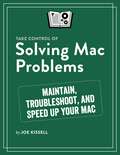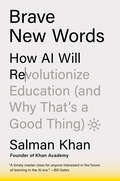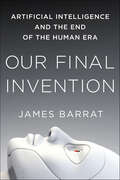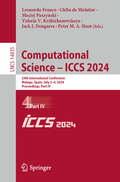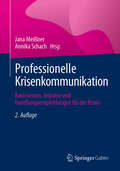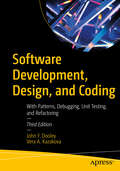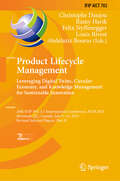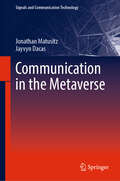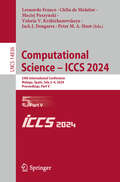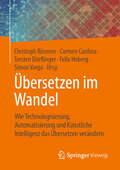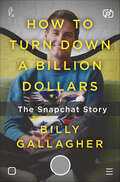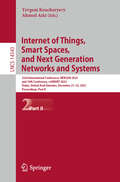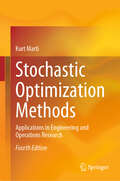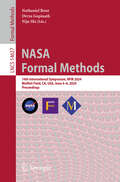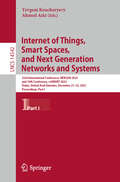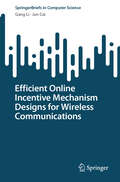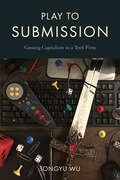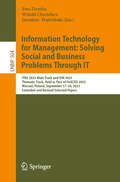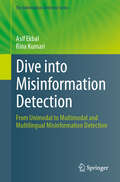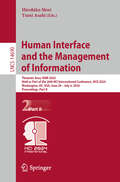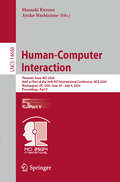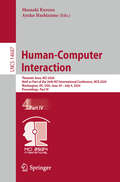- Table View
- List View
Take Control of Solving Mac Problems
by Joe KissellMacs are generally quite reliable computers, but things still can and do go wrong. When you encounter an error message, an ornery app, or other unwanted behavior, don't panic. Take a deep breath and turn to the expert advice in "Take Control of Solving Mac Problems."
Brave New Words: How AI Will Revolutionize Education (and Why That's a Good Thing)
by Salman Khan&“A timely masterclass for anyone interested in the future of learning in the AI era.&”—Bill Gates&“This book is required reading for everyone who cares about education.&”—Adam Grant, #1 New York Times bestselling author of Hidden Potential and Think Again, and host of the podcast Re:Thinking&“Read this book. It&’s the most fascinating and important account of how AI will transform the way we learn.&”—Walter Isaacson, #1 New York Times bestselling authorFrom the founder of Khan Academy, the first book on the AI revolution in education, its implications for parenting, and how we can best harness its power for good.Whether we like it or not, the AI revolution is coming to education. In Brave New Words, Salman Khan, the visionary behind Khan Academy, explores how artificial intelligence and GPT technology will transform learning, and offers a road map for teachers, parents, and students to navigate this exciting (and sometimes intimidating) new world.A pioneer in the field of education technology, Khan examines the ins and outs of these cutting-edge tools and how they will revolutionize the way we learn and teach. For parents concerned about their children&’s success, Khan illustrates how AI can personalize learning by adapting to each student&’s individual pace and style, identifying strengths and areas for improvement, and offering tailored support and feedback to complement traditional classroom instruction. Khan emphasizes that embracing AI in education is not about replacing human interaction but enhancing it with customized and accessible learning tools that encourage creative problem-solving skills and prepare students for an increasingly digital world.But Brave New Words is not just about technology—it&’s about what this technology means for our society, and the practical implications for administrators, guidance counselors, and hiring managers who can harness the power of AI in education and the workplace. Khan also delves into the ethical and social implications of AI and large language models, offering thoughtful insights into how we can use these tools to build a more accessible education system for students around the world.
Our Final Invention: Artificial Intelligence and the End of the Human Era
by James BarratElon Musk named Our Final Invention one of 5 books everyone should read about the futureA Huffington Post Definitive Tech Book of 2013Artificial Intelligence helps choose what books you buy, what movies you see, and even who you date. It puts the "smart" in your smartphone and soon it will drive your car. It makes most of the trades on Wall Street, and controls vital energy, water, and transportation infrastructure. But Artificial Intelligence can also threaten our existence.In as little as a decade, AI could match and then surpass human intelligence. Corporations and government agencies are pouring billions into achieving AI's Holy Grail—human-level intelligence. Once AI has attained it, scientists argue, it will have survival drives much like our own. We may be forced to compete with a rival more cunning, more powerful, and more alien than we can imagine. Through profiles of tech visionaries, industry watchdogs, and groundbreaking AI systems, Our Final Invention explores the perils of the heedless pursuit of advanced AI. Until now, human intelligence has had no rival. Can we coexist with beings whose intelligence dwarfs our own? And will they allow us to?
Computational Science – ICCS 2024: 24th International Conference, Malaga, Spain, July 2–4, 2024, Proceedings, Part IV (Lecture Notes in Computer Science #14835)
by Valeria V. Krzhizhanovskaya Jack J. Dongarra Peter M. A. Sloot Maciej Paszynski Clélia De Mulatier Leonardo FrancoThe 7-volume set LNCS 14832 – 14838 constitutes the proceedings of the 24th International Conference on Computational Science, ICCS 2024, which took place in Malaga, Spain, during July 2–4, 2024. The 155 full papers and 70 short papers included in these proceedings were carefully reviewed and selected from 430 submissions. They were organized in topical sections as follows: Part I: ICCS 2024 Main Track Full Papers; Part II: ICCS 2024 Main Track Full Papers; Part III: ICCS 2024 Main Track Short Papers; Advances in High-Performance Computational Earth Sciences: Numerical Methods, Frameworks and Applications; Artificial Intelligence and High-Performance Computing for Advanced Simulations; Part IV: Biomedical and Bioinformatics Challenges for Computer Science; Computational Health; Part V: Computational Optimization, Modelling, and Simulation; Generative AI and Large Language Models (LLMs) in Advancing Computational Medicine; Machine Learning and Data Assimilation for Dynamical Systems; Multiscale Modelling and Simulation; Part VI: Network Models and Analysis: From Foundations to Artificial Intelligence; Numerical Algorithms and Computer Arithmetic for Computational Science; Quantum Computing; Part VII: Simulations of Flow and Transport: Modeling, Algorithms and Computation; Smart Systems: Bringing Together Computer Vision, Sensor Networks, and Artificial Intelligence; Solving Problems with Uncertainties; Teaching Computational Science
Professionelle Krisenkommunikation: Basiswissen, Impulse und Handlungsempfehlungen für die Praxis
by Annika Schach Jana MeißnerDieses Buch beschreibt, wie Unternehmen Krisen kommunikativ erfolgreich managen und bewältigen können. Krisenkommunikation muss im Ernstfall schnell und hochprofessionell erfolgen. Dies gelingt nur, wenn Unternehmensführung, Krisen- und Risikomanagement, Fachabteilungen und die Unternehmenskommunikation vor, während und nach einer Krise zielorientiert zusammenarbeiten. Funktioniert das, können das (Krisen)Management und die (Krisen)Kommunikation das Vertrauen in eine Organisation sogar stärken. Expertinnen und Experten aus Praxis, Wissenschaft und Lehre vermitteln in diesem Buch, was erfolgreiche Krisenkommunikation auszeichnet und geben anhand von Beispielen konkrete Handlungsempfehlungen. Zu den behandelten Themen gehören neben dem Fokus auf die Krisenkommunikation unter anderen: Notfall- und Krisenmanagement, Risikomanagement, Business Continuity Management und weitere Managementsysteme Organisationaler Resilienz. Aktueller denn je ermöglicht dasBuch einen ganzheitlichen Blick auf die Krisenkommunikation und hilft Praktikern, ihre Kompetenzen zu erweitern und zu vertiefen.Die zweite Auflage wurde überarbeitet und um Beiträge zu den Themen Cyberangriffe, ChatGPT, Medienmonitoring und KI sowie zu Krisenkommunikation in Demokratien und im Insolvenzfall ergänzt.
Software Development, Design, and Coding: With Patterns, Debugging, Unit Testing, and Refactoring
by John F. Dooley Vera A. KazakovaLearn the principles of good software design and then turn those principles into great code. This book introduces you to software engineering — from the application of engineering principles to the development of software. You'll see how to run a software development project, examine the different phases of a project, and learn how to design and implement programs that solve specific problems. This book is also about code construction — how to write great programs and make them work. This new third edition is revamped to reflect significant changes in the software development landscape with updated design and coding examples and figures. Extreme programming takes a backseat, making way for expanded coverage of the most crucial agile methodologies today: Scrum, Lean Software Development, Kanban, and Dark Scrum. Agile principles are revised to explore further functionalities of requirement gathering. The authors venture beyond imperative and object-oriented languages, exploring the realm of scripting languages in an expanded chapter on Code Construction. The Project Management Essentials chapter has been revamped and expanded to incorporate "SoftAware Development” to discuss the crucial interpersonal nature of joint software creation. Whether you're new to programming or have written hundreds of applications, in this book you'll re-examine what you already do, and you'll investigate ways to improve. Using the Java language, you'll look deeply into coding standards, debugging, unit testing, modularity, and other characteristics of good programs. You Will Learn Modern agile methodologies How to work on and with development teams How to leverage the capabilities of modern computer systems with parallel programming How to work with design patterns to exploit application development best practices How to use modern tools for development, collaboration, and source code controls Who This Book Is For Early career software developers, or upper-level students in software engineering courses
Product Lifecycle Management. Leveraging Digital Twins, Circular Economy, and Knowledge Management for Sustainable Innovation: 20th IFIP WG 5.1 International Conference, PLM 2023, Montreal, QC, Canada, July 9–12, 2023, Revised Selected Papers, Part II (IFIP Advances in Information and Communication Technology #702)
by Abdelaziz Bouras Ramy Harik Louis Rivest Felix Nyffenegger Christophe DanjouThis two-volume set IFIP AICT 701-702 constitutes the refereed post-conference proceedings of the 20th IFIP WG 5.1 International Conference on Product Lifecycle Management: Leveraging Digital Twins, Circular Economy, and Knowledge Management for Sustainable Innovation, PLM 2023, held in Montreal, QC, Canada, during July 9–12, 2023. The 61 regular papers included in this book were carefully reviewed and selected from 116 submissions. They are organized in the following thematic sections: Part I: Technology implementation: augmented reality, CPS and digital twin; organisation: knowledge management, change management, frameworks for project and service development; modelisation : CAD and collaboration, model-based system engineering and building information modeling. Part II: Circular economy: characterization, criteria and implementation; interoperability technology: blockchain, IoT and ontologies for data exchange; learning and training: from AI to a human-centric approach; smart processes: prediction, optimization and digital thread.
Objektbasierte Programmierung mit Go
by Christian MaurerDieses Buch erklärt das Konzept „Objektbasierung“ als wesentlichen Teil der „Objektorientierung“ und erläutert, warum Go eine Programmiersprache ist, die dieses Konzept optimal unterstützt. Anhand wesentlicher Teile des Mikrouniversums, einer großen Sammlung von Softwarekomponenten (mit Quellcode im Umfang von mehr als 53000 Programmzeilen), werden viele wichtige Datentypen mit ihren Algorithmen beschrieben.Im praktischen Teil werden diverse Programmpakete präsentiert, die nach diesem Konzept konstruiert sind.
Communication in the Metaverse (Signals and Communication Technology)
by Jonathan Matusitz Jayvyn DacasThis book explores the diverse methods and facets of communication in the metaverse, from interpersonal relationships to health communication, and from collaboration in the workplace to social interaction in educational contexts. More specifically, the book analyses the profound interplay between the metaverse and the larger communicative context in which it is entrenched. In this manner, the work concentrates on the factors underlying its origins, development, actualization, and popularity, as well as the fundamental discords, uncertainties, and dangers that can have serious consequences on both society and the individual. Explores diverse methods of communication in the metaverse, from interpersonal relationships to health communication; Analyses the interplay between the metaverse and the larger communicative context in which it is entrenched; Concentrates on the metaverse’s popularity and potential as well as the discords and dangers it presents.
The Bite in the Apple: A Memoir of My Life with Steve Jobs
by Chrisann BrennanAn intimate look at the life of Steve Jobs by the mother of his first child providing rare insight into Jobs's formative, lesser-known years.Steve Jobs was a remarkable man who wanted to unify the world through technology. For him, the point was to set people free with tools to explore their own unique creativity. Chrisann Brennan knows this better than anyone. She met him in high school, at a time when Jobs was passionately aware that there was something much bigger to be had out of life, and that new kinds of revelations were within reach.The Bite in the Apple is the very human tale of Jobs's ascent and the toll it took, told from the author's unique perspective as his first girlfriend, co-parent, friend, and—like many others—object of his cruelty. Brennan writes with depth and breadth, and she doesn't buy into all the hype. She talks with passion about an idealistic young man who was driven to change the world, about a young father who denied his own child, and about a man who mistook power for love. Chrisann Brennan's intimate memoir provides the reader with a human dimension to Jobs' myth. Finally, a book that reveals a more real Steve Jobs.
Computational Science – ICCS 2024: 24th International Conference, Malaga, Spain, July 2–4, 2024, Proceedings, Part V (Lecture Notes in Computer Science #14836)
by Valeria V. Krzhizhanovskaya Jack J. Dongarra Peter M. A. Sloot Maciej Paszynski Clélia De Mulatier Leonardo FrancoThe 7-volume set LNCS 14832 – 14838 constitutes the proceedings of the 24th International Conference on Computational Science, ICCS 2024, which took place in Malaga, Spain, during July 2–4, 2024. The 155 full papers and 70 short papers included in these proceedings were carefully reviewed and selected from 430 submissions. They were organized in topical sections as follows: Part I: ICCS 2024 Main Track Full Papers; Part II: ICCS 2024 Main Track Full Papers; Part III: ICCS 2024 Main Track Short Papers; Advances in High-Performance Computational Earth Sciences: Numerical Methods, Frameworks and Applications; Artificial Intelligence and High-Performance Computing for Advanced Simulations; Part IV: Biomedical and Bioinformatics Challenges for Computer Science; Computational Health; Part V: Computational Optimization, Modelling, and Simulation; Generative AI and Large Language Models (LLMs) in Advancing Computational Medicine; Machine Learning and Data Assimilation for Dynamical Systems; Multiscale Modelling and Simulation; Part VI: Network Models and Analysis: From Foundations to Artificial Intelligence; Numerical Algorithms and Computer Arithmetic for Computational Science; Quantum Computing; Part VII: Simulations of Flow and Transport: Modeling, Algorithms and Computation; Smart Systems: Bringing Together Computer Vision, Sensor Networks, and Artificial Intelligence; Solving Problems with Uncertainties; Teaching Computational Science
Übersetzen im Wandel: Wie Technologisierung, Automatisierung und Künstliche Intelligenz das Übersetzen verändern
by Christoph Rösener Carmen Canfora Torsten Dörflinger Felix Hoberg Simon VargaDer Fachbereich Translations-, Sprach- und Kulturwissenschaft (FTSK) Germersheim der Johannes Gutenberg-Universität Mainz feierte im Jahr 2022 sein 75-jähriges Bestehen. Dieses Jubiläum nahm der Germersheimer Arbeitsbereich Allgemeine und Angewandte Sprachwissenschaft sowie Translationstechnologie (ASTT) zum Anlass, im Rahmen einer Tagung 2022 einen Blick nicht auf die Vergangenheit, sondern die Zukunft des Übersetzerberufs zu werfen. Im Zentrum des Interesses standen dabei die Auswirkungen, die der Übersetzerberuf und die Übersetzerausbildung im Zuge des digitalen Wandels erfahren, der insbesondere in Gestalt der Maschinellen Übersetzung und der fortschreitenden Automatisierung von Übersetzungsprozessen die Branche zunehmend prägt.Welche Kompetenzen müssen Studierenden heute vermittelt werden, damit sie in der Berufswelt von morgen ihren Platz finden? Wie kann man sie mit einer positiven Haltung dem digitalen Wandel gegenüber ausstatten und ihnen somit eine aktive Rolle in diesemSystem ermöglichen?
How to Turn Down a Billion Dollars: The Snapchat Story
by Billy Gallagher"In the grand tradition of Ben Mezrich's The Accidental Billionaires (2009)... an engaging look into a fascinating subculture of millions." —Booklist"Breezy...How to Turn Down a Billion Dollars ably if uncritically chronicles the short history of a young company catering to young users, with a young chief executive, and reveals, intentionally or not, the limitations that come with that combination." —Wall Street JournalThe improbable and exhilarating story of the rise of Snapchat from a frat boy fantasy to a multi-billion dollar internet unicorn that has dramatically changed the way we communicate.In 2013 Evan Spiegel, the brash CEO of the social network Snapchat, and his co-founder Bobby Murphy stunned the press when they walked away from a three-billion-dollar offer from Facebook: how could an app teenagers use to text dirty photos dream of a higher valuation? Was this hubris, or genius? In How to Turn Down a Billion Dollars, tech journalist Billy Gallagher takes us inside the rise of one of Silicon Valley's hottest start-ups. Snapchat developed from a simple wish for disappearing pictures as Stanford junior Reggie Brown nursed regrets about photos he had sent. After an epic feud between best friends, Brown lost his stake in the company, while Spiegel has gone on to make a name for himself as a visionary—if ruthless—CEO worth billions, linked to celebrities like Taylor Swift and his wife, Miranda Kerr. A fellow Stanford undergrad and fraternity brother of the company’s founding trio, Gallagher has covered Snapchat from the start. He brings unique access to a company Bloomberg Business called “a cipher in the Silicon Valley technology community.” Gallagher offers insight into challenges Snapchat faces as it transitions from a playful app to one of the tech industry’s preeminent public companies. In the tradition of great business narratives, How to Turn Down a Billion Dollars offers the definitive account of a company whose goal is no less than to remake the future of entertainment.
Internet of Things, Smart Spaces, and Next Generation Networks and Systems: 23rd International Conference, NEW2AN 2023, and 16th Conference, ruSMART 2023, Dubai, United Arab Emirates, December 21–22, 2023, Proceedings, Part II (Lecture Notes in Computer Science #14543)
by Yevgeni Koucheryavy Ahmed AzizThis book constitutes the refereed proceedings of the 23rd International Conference on Next Generation Wired/Wireless Networking, NEW2AN 2023, and the 16th Conference on Internet of Things and Smart Spaces, ruSMART 2023, held in Dubai, United Arab Emirates, in December 21–22, 2023. The 67 full papers were carefully reviewed and selected from 258 submissions. The NEW2AN 2023 is well-established conference with a unique cross-disciplinary mixture of telecommunications-related research and science, various aspects of next generation data networks, while special attention is given to advanced wireless networking and applications.
Stochastic Optimization Methods: Applications in Engineering and Operations Research
by Kurt MartiThis book examines optimization problems that in practice involve random model parameters. It outlines the computation of robust optimal solutions, i.e., optimal solutions that are insensitive to random parameter variations, where appropriate deterministic substitute problems are needed. Based on the probability distribution of the random data and using decision theoretical concepts, optimization problems under stochastic uncertainty are converted into corresponding deterministic problems.Due to the probabilities and expectations involved, the book also shows how to apply approximative solution techniques. Several deterministic and stochastic approximation methods are provided: Taylor expansion methods, regression and response surface methods (RSM), probability inequalities, multiple linearization of survival/failure domains, discretization methods, convex approximation/deterministic descent directions/efficient points, stochastic approximation and gradient procedures, and differentiation formulas for probabilities and expectations.The fourth edition of this classic text has been carefully and thoroughly revised. It includes new chapters on the solution of stochastic linear programs by discretization of the underlying probability distribution, and on solving deterministic optimization problems by means of controlled random search methods and multiple random search procedures. It also presents a new application of stochastic optimization methods to machine learning problems with different loss functions. For the computation of optimal feedback controls under stochastic uncertainty, besides the open-loop feedback procedures, a new method based on Taylor expansions with respect to the gain parameters is presented. The book is intended for researchers and graduate students who are interested in stochastics, stochastic optimization, and control. It will also benefit professionals and practitioners whose work involves technical, economicand/or operations research problems under stochastic uncertainty.
NASA Formal Methods: 16th International Symposium, NFM 2024, Moffett Field, CA, USA, June 4–6, 2024, Proceedings (Lecture Notes in Computer Science #14627)
by Nathaniel Benz Divya Gopinath Nija ShiThis LNCS 14627 conference volume constitutes the proceedings of the 16th International Symposium on NASA Formal Methods, NFM 2024, held in Moffett Field, CA, USA in June 2024. The 20 full papers together with 6 short papers included in this volume were carefully reviewed and selected from 68 submissions. The conference focuses on the on formal techniques for software and system assurance for applications in space, aviation, robotics, and other NASA-relevant safety-critical systems.
Internet of Things, Smart Spaces, and Next Generation Networks and Systems: 23rd International Conference, NEW2AN 2023, and 16th Conference, ruSMART 2023, Dubai, United Arab Emirates, December 21–22, 2023, Proceedings, Part I (Lecture Notes in Computer Science #14542)
by Yevgeni Koucheryavy Ahmed AzizThis book constitutes the refereed proceedings of the 23rd International Conference on Next Generation Wired/Wireless Networking, NEW2AN 2023, and the 16th Conference on Internet of Things and Smart Spaces, ruSMART 2023, held in Dubai, United Arab Emirates, in December 21–22, 2023. The 67 full papers included in the joint proceedings were carefully reviewed and selected from 258 submissions. They present a unique cross-disciplinary mixture of telecommunications-related research and science, various aspects of next generation data networks, while special attention is given to advanced wireless networking and applications.
Efficient Online Incentive Mechanism Designs for Wireless Communications (SpringerBriefs in Computer Science)
by Gang Li Jun CaiThis book initially delves into its fundamentals to initiate the exploration of online incentive mechanisms in wireless communications. Three case studies are provided to elaborate details on designing online mechanism design in practical system. For crowdsensing with random task arrivals, this book introduces a linear online incentive mechanism model with insurance of the quality of information for each incoming task. In the context of edge computing systems, the authors model a nonlinear online incentive mechanism with the consideration of mobile users’ energy budget constraints. It also explores online incentive mechanism for collaborative task offloading in mobile edge computing to achieve on-arrival instant responses. This book not only disseminates current knowledge but also sheds light on future research directions. The design of incentive mechanisms in wireless communication systems is of paramount importance as it encourages dormant terminals within networks to contribute their valuable resources. The consideration of randomness of network processes enhances the mechanism design under online settings and decision making on the fly. This book endeavours to bridge existing knowledge gaps by comprehensively presenting and developing fundamental insights into online incentive mechanisms and their design methods in the realm of wireless communications. It’s one of the first books to provide a comprehensive understanding of the fundamental principles of online incentive mechanisms and their intricately designed methods in the dynamic world of wireless communications. Future research directions include an investigation in the evolving domain of online incentive mechanism designs within wireless communications. This book strikes a balance between theoretical knowledge and practical application, making it a valuable resource for both researchers and practitioners in the field of wireless communications and network economics. Advanced-level students majoring in computer science and/or electrical engineering will want to purchase this book as a study guide.
Play to Submission: Gaming Capitalism in a Tech Firm
by Tongu WuGames are often a fun perk of a tech company job, and employees can “play to win” in the competition to succeed. But in studying “Behemoth” (a pseudonym for a top American tech company), Tongyu Wu discovered that gaming work culture was far more insidious. Play to Submission shows how Behemoth’s games undermined and manipulated workers. They lost their work-life balance and the constant competition made labor organizing difficult. Nonetheless, many workers embraced management’s games as a chance to show off their “gamer” identities and create a workplace culture with privileged insiders and exiled outsiders, with female and migrant workers usually in the latter group. Moreover, Wu indicates this may be the future of work for high- and low-skilled and, creative workers in an environment where capitalists have heightened demands for technology and creativity. Drawing from 13 months of ethnographic work, Wu presents a persistent reality in which the company reaps the reward of surplus productivity, leaving employees themselves in a highly competitive and sometimes precarious work position.
Information Technology for Management: ITBS 2023 Main Track and ISM 2023 Thematic Track, Held as Part of FedCSIS 2023, Warsaw, Poland, September 17–20, 2023, Extended and Revised Selected Papers (Lecture Notes in Business Information Processing #504)
by Ewa Ziemba Witold Chmielarz Jarosław WątróbskiThe present book includes extended and revised versions of a set of selected papers submitted to the Topical Area of Information Technology for Business and Society, ITBS 2023, and two Thematic Tracks: Information System Management, ISM 2023, and Knowledge Acquisition and Management, KAM 2023, held in Poland, Warsaw, during September 17- 20, 2023. ITBS 2023 received 26 submissions, from which 6 full papers and 2 short papers have been accepted; for ISM 2023 3 full papers and 1 short paper have been accepted from 21 submissions; and for KAM 2023 1 full paper has been accepted from 7 submissions. From the 6 submissions to DSH 2023, no paper passed the extended reviews. The accepted papers are grouped in sections on IT in Improving of Management Systems, Approaches to Improving of Social Problems, and Methods of Solving Business.
Dive into Misinformation Detection: From Unimodal to Multimodal and Multilingual Misinformation Detection (The Information Retrieval Series #30)
by Asif Ekbal Rina KumariThis book delivers a brief introduction to misinformation, and various novel approaches for solving misinformation detection problems. It considers all kinds of false information as fake news or misinformation and uses the terms fake news and misinformation interchangeably, in text, images, audio and video. The primary purpose is to provide a foundation for the problems of misinformation or false content detection including various challenges and approaches to solve them. The book starts with an overall description of misinformation. It briefly introduces the history, various issues or challenges, reasons for creating and spreading misinformation, and its impact on individuals and society. The second chapter discusses prior works on misinformation detection and explores various datasets, recent advancements, and state-of-the-art mechanisms. Chapter three demonstrates that the presence of surprising content in a story draws instant attention and appeals to strong emotional stimuli, and subsequently explores the application of novelty and emotion in the misinformation detection domain. Next, chapter four first introduces multitasking and discusses its advantages, before developing a framework for joint learning of interrelated tasks such as emotion recognition, novelty detection, and misinformation detection. The fifth chapter explores various datasets and mechanisms leveraging multimodal information, and eventually explains the fusion mechanisms of text and image modalities to obtain an efficient multimodal feature that ultimately helps to classify multimedia fake news. Chapter six discusses how novelty and emotion can be helpful in multimodal misinformation detection. It shows that detecting misleading information is difficult without earlier knowledge about that particular news and explores the possible solutions to tackle this problem. Eventually, chapter seven introduces the concept of multilingualism and implements an effective neural model to detectfabricated multilingual information, which overcomes the research and development gap in misinformation detection for regional languages. The final chapter eight briefly summarizes the presented results. This book is mainly written for researchers and graduate students specializing in fake news search and detection, as well as for industry professionals who need to explore various dimensions of misinformation detection regardless of their past knowledge and experience.
Human Interface and the Management of Information: Thematic Area, HIMI 2024, Held as Part of the 26th HCI International Conference, HCII 2024, Washington, DC, USA, June 29–July 4, 2024, Proceedings, Part II (Lecture Notes in Computer Science #14690)
by Hirohiko Mori Yumi AsahiThis three-volume set LNCS 14789-14791 constitutes the thoroughly refereed proceedings of the thematic area Human Interface and the Management of Information, HIMI 2024, held as part of the 26th International Conference on Human-Computer Interaction, HCI International 2024 (HCII 2024), was held as a hybrid event in Washington DC, USA, during June/July 2024. The total of 1271 papers and 309 posters included in the HCII 2023 proceedings was carefully reviewed and selected from 5108 submissions. The HIMI conference addressed approaches and objectives of information and data design, retrieval, presentation and visualization, management, and evaluation in human computer interaction in a variety of application domains, such as, for example, learning, work, decision, collaboration, medical support, and service engineering, and much more.
Literature and Computation: Platform Intermediality, Hermeneutic Modeling, and Analytical-Creative Approaches (Routledge New Textual Studies in Literature)
by Chris TanasescuLiterature and Computation presents some of the most relevantly innovative recent approaches to literary practice, theory, and criticism as driven by computation and situated in digital environments. These approaches rely on automated analyses, but use them creatively, engage in text modeling but inform it with qualitative[-interpretive] critical possibilities, and contribute to present-day platform culture in revolutionizing intermedial ways. While such new directions involve more and more sophisticated machine learning and artificial intelligence, they also mark a spectacular return of the (trans)human(istic) and of traditional-modern literary or urgent political, gender, and minority-related concerns and modes now addressed in ever subtler and more nuanced ways within human-computer interaction frameworks. Expanding the boundaries of literary and data studies, digital humanities, and electronic literature, the featured contributions unveil an emerging landscape of trailblazing practice and theoretical crossovers ready and able to spawn and/or chart the witness literature of our age and cultures.
Human-Computer Interaction: Thematic Area, HCI 2024, Held as Part of the 26th HCI International Conference, HCII 2024, Washington, DC, USA, June 29 – July 4, 2024, Proceedings, Part V (Lecture Notes in Computer Science #14688)
by Masaaki Kurosu Ayako HashizumeThis five-volume set LNCS 14684-14688 constitutes the refereed proceedings of the Human Computer Interaction thematic area of the 26 International Conference on Human-Computer Interaction, HCII 2024, held in Washington, DC, USA, during June 29 – July 4, 2024. The total of 1271 papers and 309 posters included in the HCII 2024 proceedings was carefully reviewed and selected from 5108 submissions. The VAMR 2024 proceedings were organized in the following topical sections: Part I: HCI Theory and Design and Evaluation Methods and Tools; Emotions in HCI. Part II: Human-Robot Interaction; Child-Computer Interaction. Part III: HCI for Mental Health and Psychological Wellbeing; HCI in Healthcare. Part IV: HCI, Environment and Sustainability; Design and User Experience Evaluation Case Studies. Part V: Multimodality and Natural User Interfaces; HCI, AI, Creativity, Art and Culture.
Human-Computer Interaction: Thematic Area, HCI 2024, Held as Part of the 26th HCI International Conference, HCII 2024, Washington, DC, USA, June 29 – July 4, 2024, Proceedings, Part IV (Lecture Notes in Computer Science #14687)
by Masaaki Kurosu Ayako HashizumeThis five-volume set LNCS 14684-14688 constitutes the refereed proceedings of the Human Computer Interaction thematic area of the 26 International Conference on Human-Computer Interaction, HCII 2024, held in Washington, DC, USA, during June 29 – July 4, 2024. The total of 1271 papers and 309 posters included in the HCII 2024 proceedings was carefully reviewed and selected from 5108 submissions. The VAMR 2024 proceedings were organized in the following topical sections: Part I: HCI Theory and Design and Evaluation Methods and Tools; Emotions in HCI. Part II: Human-Robot Interaction; Child-Computer Interaction. Part III: HCI for Mental Health and Psychological Wellbeing; HCI in Healthcare. Part IV: HCI, Environment and Sustainability; Design and User Experience Evaluation Case Studies. Part V: Multimodality and Natural User Interfaces; HCI, AI, Creativity, Art and Culture.
